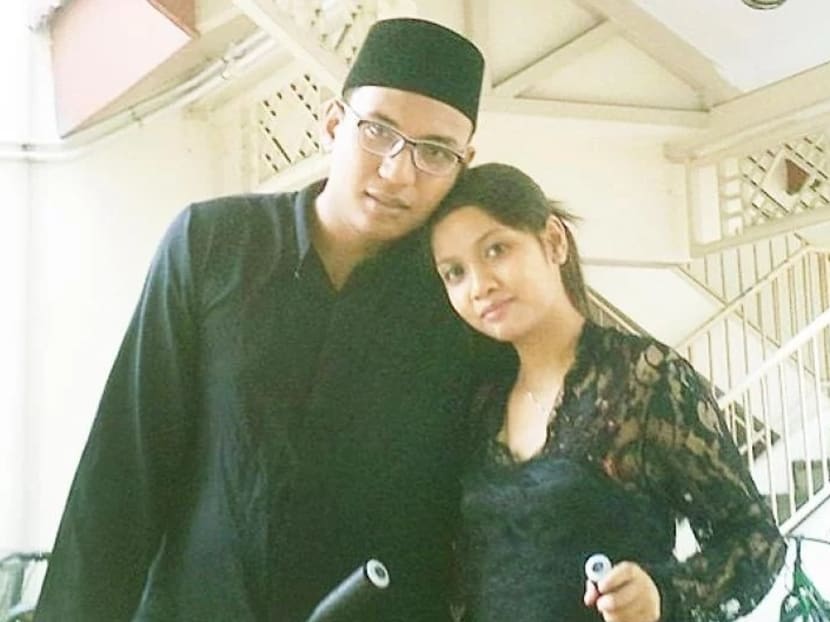Mother who abused 5-year-old son to death jailed for life, after court rejects prosecution's appeal for death sentence
SINGAPORE — A woman convicted of murdering her five-year-old son through various acts of abuse was on Tuesday (Oct 18) sentenced to life imprisonment, after the apex court decided that she should not receive the death penalty.

- Azlin Arujunah and Ridzuan Mega Abdul Rahman were originally sentenced to 28 years’ jail, and 27 years’ jail with caning respectively
- Previously, they were acquitted of murder by common intention for fatally abusing their five-year-old son to death
- The apex court accepted on July 12 the prosecution's appeals against Ridzuan’s sentence and Azlin’s murder acquittal
- Ridzuan received the maximum sentence of life imprisonment for his reduced charge
- On Tuesday, Azlin was also given life imprisonment for murder
SINGAPORE — A woman convicted of murdering her five-year-old son through various acts of abuse was on Tuesday (Oct 18) sentenced to life imprisonment, after the apex court decided that she should not receive the death penalty.
Azlin Arujunah’s husband, Ridzuan Mega Abdul Rahman, had already been sentenced to a life term in July. On Tuesday, the Court of Appeal further ruled that he should not be caned.
Both parents abused their son over a span of three months in 2016, scalding him with hot water on four occasions until he died on Oct 23 that year. He suffered severe injuries such as second- to third-degree burns over two-thirds of his body, nasal bone fractures and extensive bruises.
The boy cannot be named to protect the identity of his surviving siblings.
Azlin and Ridzuan, now aged 30, were originally acquitted of murder and sentenced to 27 years’ jail each after a High Court trial.
The prosecution then appealed against the sentences imposed on Azlin and Ridzuan. At the time, prosecutors sought life imprisonment in both cases, as well as for Azlin to be convicted of murder by common intention.
In July, the Court of Appeal sentenced Ridzuan to the maximum term of life imprisonment. They also convicted Azlin of murder under Section 300(c) of the Penal Code, but did not sentence her just yet.
Following this, the prosecution called for Azlin to be given the death sentence.
In a written judgement on Tuesday, five judges in the Court of Appeal agreed that objective, reasonable members of the community would find Azlin’s abuse of her son to be cruel and inhumane.
They wrote: "This case presents an especially tragic set of facts, as the deceased was a young child whose death was caused by his own parents in circumstances that were cruel, inexcusable and entirely avoidable."
However, in rejecting the prosecution’s arguments for a death sentence, the judges found that the evidence did not prove beyond a reasonable doubt that Azlin knew her son would likely die from the repeated scalding incidents.
Because of this, the apex court said they were not satisfied the death penalty — imposed when offenders show viciousness or a blatant disregard for human life — was warranted.

WHAT HAPPENED
Both parents were originally charged with murder with common intention, along with other charges related to the fatal abuse.
This murder charge was premised on four acts of burning or scalding committed in the couple’s one-room rental flat from Oct 15 to 22 in 2016. The boy died shortly after that.
Following a High Court trial that ended in mid-2020, Azlin and Ridzuan were acquitted of murder and sentenced to 27 years’ jail each on reduced charges of voluntarily causing grievous hurt by a dangerous weapon or means. Life imprisonment is the maximum punishment for this offence.
Azlin was given one more year behind bars in lieu of caning, taking her total jail sentence to 28 years, while Ridzuan was further sentenced to 24 strokes of the cane.
High Court judge Valerie Thean found that the element of common intention in their murder charges was not sufficiently proven, since not all of the incidents involved both parents.
The judge also declined to impose life imprisonment, saying it was not appropriate because medical evidence could not determine which injuries arose from which incidents.
A TIMELINE OF THE ABUSES
2015
- The four-year-old boy, who was sent to foster parents when he was a month old, leaves his foster home to return to live with his parents. Ridzuan and Azlin had been unemployed and lived on financial assistance, with Ridzuan selling things such as love potions and amulets on e-marketplace Carousell
July 2016
- Ridzuan uses a pair of pliers on two separate days to pinch the boy’s buttocks and thighs several times, causing bruises
August 2016
- Azlin hits the boy with a broom on his body, back and legs, after he denied knocking over a biscuit tin and scattering biscuits on the kitchen floor. This left marks on his stomach and caused him to develop a limp and a misaligned kneecap
- Azlin pushes the boy on his shoulder, causing him to fall. His head strikes a pillar and begins bleeding
October 2016
- Ridzuan burns the boy’s palm with a heated metal spoon
- Ridzuan flicks cigarette ash from a lit cigarette on his son's arms when he refuses to answer, and uses a hanger to hit him on the palm when he denies stealing milk powder
Oct 15 to 17, 2016
- Azlin grabs the boy by his ankle to prevent him from running away, fills a glass with hot water from a dispenser, pours it over his right leg three times and over his hand about five times. The boy’s skin begins peeling, and blisters form on his chest, shoulder and leg
Oct 17 to 19, 2016
- Azlin grows angry when the boy shouts, “Are you crazy or what?”, in Malay after she splashed hot water on him. Both Azlin and Ridzuan then throw several more cups of hot water at him
- Ridzuan burns the boy’s palm again with a heated spoon, after finding out he had stolen milk powder to eat
Oct 19 to 20, 2016
- Azlin threatens to splash the boy with hot water when he refuses to answer their questions, but does not do so because he is standing near internet cables. She then pushes him forcefully, causing his head to hit the wall and bleed
- Ridzuan then punches the boy in the face
Oct 21 to 22, 2016
- The couple confines the boy in a cat cage that measures 70cm in height, 58cm in width and 90cm in length. The boy is 105cm tall
- Azlin splashes the boy with nine to 10 cups of hot water, chasing him around the living room when he asks her for things
Oct 22, 2016
- Ridzuan hits his son with a broom on his head, hands and legs to make him take off his shorts for a bath. When the boy is in the toilet, Ridzuan allegedly throws cups of hot water at him, while Azlin shouts at her son to get him to take off his shorts. The boy falls forwards onto the floor and stops moving after Ridzuan pours more water over his back. They take him to the hospital after more than six hours, because they are afraid they would be arrested for child abuse
Oct 23, 2016
- The boy dies from his injuries and is pronounced dead at KK Women’s and Children’s Hospital at around 9am
APEX COURT'S DECISION
On Tuesday, the apex court — led by Chief Justice Sundaresh Menon — referred to the precedent case of Kho Jabing, which laid out sentencing guidelines for murder.
Kho, a Sarawakian from Malaysia, was hanged in 2016 after he killed a Chinese construction worker during a robbery by bashing the victim on the head repeatedly with a tree branch.
In Kho’s case, the death penalty is appropriate when an offender exhibits viciousness or demonstrates a blatant disregard for human life.
The appellate judges noted that while cruelty or a display of inhumane treatment is a relevant sentencing factor, the courts should not be distracted by the gruesomeness of a crime scene in determining whether to impose the death penalty.
“Rather, it must, as we have already noted, consider all the circumstances of the case, including the offender’s age, motive and intelligence, to determine whether the offender has acted in a way which exhibits such a blatant disregard for human life as to outrage the feelings of the community.”
The judges considered Justice Thean’s finding that Azlin did not wholly understand the likelihood of death stemming from her actions.
In her statements to the police, she said she thought the boy’s scald injuries would heal on their own, citing her own childhood experience of being scalded by her parents. She also applied cream on the boy’s peeling skin, among other acts.
The prosecution, led by Deputy Chief Prosecutor Mohamed Faizal Mohamed Abdul Kadir and Deputy Public Prosecutor Norine Tan, challenged this finding in their appeal.
They argued that it would be obvious to anyone that the boy’s extensive scalding would potentially be deadly and that Azlin saw the boy’s “dreadful condition” firsthand.
When the boy died in hospital, his skin had turned yellow, wet and raw, with parts peeling off.
The Court of Appeal disagreed that the evidence proved this beyond a reasonable doubt.
Azlin’s murder charge meant that she only needed to intend to cause the boy’s injuries. However, she could — and apparently did — hold this intention without comprehending there was a real possibility this could be fatal, the judges found.
The judges wrote: “None of this detracts from the horrific, unacceptable and vicious nature of the injuries. Azlin was the mother of the deceased and for her to intentionally commit the various acts of abuse against her young son is immensely disturbing.
“But we reiterate the point we made earlier that the yardstick at law for deciding to impose the death penalty must be one that is rational and principled rather than one that is visceral.”
As for Ridzuan’s sentence, the prosecution argued for 12 strokes of the cane along with life imprisonment.
The Court of Appeal rejected the submissions for caning, agreeing with Justice Thean that Ridzuan shared a very similar degree of culpability with Azlin and should not be given a more onerous sentence.
The five-judge apex court panel comprised Chief Justice Menon along with Judges of Appeal Andrew Phang, Judith Prakash, Tay Yong Kwang and Steven Chong.
Azlin was defended by Mr Amarick Gill and Ms Cheryl Ng, while Mr Eugene Thuraisingam and Mr Chooi Jing Yen represented Ridzuan.








